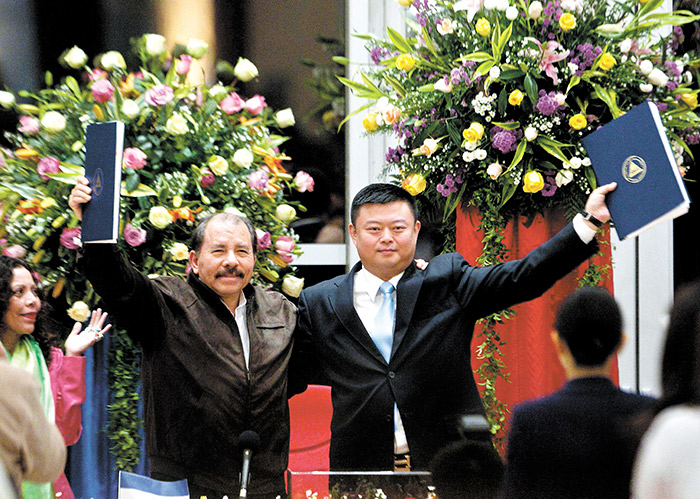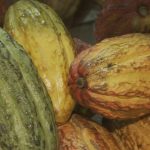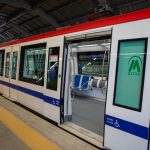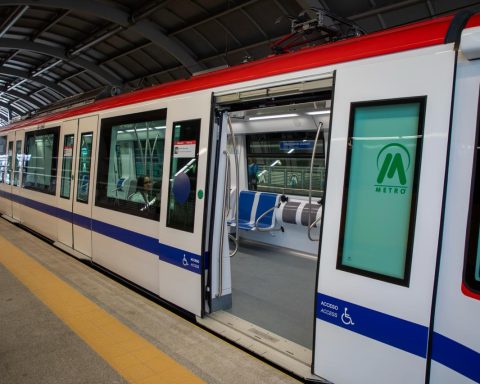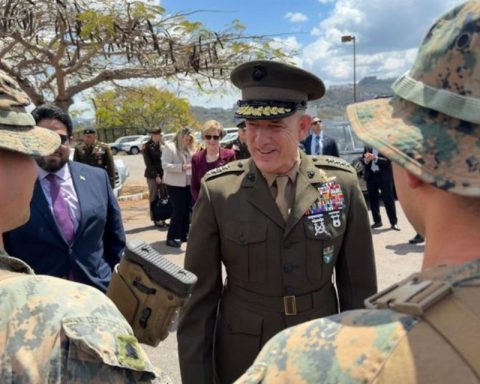On Thursday, June 13, 2013, a rainy day, Managua woke up agitated and besieged by police. Civil society organizations had called for a protest march in front of the National Assembly building to reject the discussion and approval of the “Special Law for the Development of Nicaraguan Infrastructures and Transportation Related to the Canal, Free Trade Zones and Associated Infrastructures” .
That day, first under the sun and then in the rain, some 300 people with banners and banners that read “Ortega sells the country” came up against a barrier of police and patrols on the outskirts of the legislative building, while Law 840, known as Law 840, was approved inside. in short as the Interoceanic Canal Law.
Days before, the propaganda machine of the Sandinista dictatorship had launched its spokesmen, media, and allies to support the approval of the aforementioned law, with which it handed over the country as a concession for 100 years, to a Chinese magnate unknown in these tropical lands.
The biggest act of selling homeland
“This is the largest act of selling out the homeland signed in the history of Nicaragua, surpassing in importance the Chamorro-Bryan treaty of 1914, which until then was considered the greatest betrayal of the homeland,” said a historian on condition of anonymity, for reasons of confidentiality. security.
The aforementioned treaty was signed on August 5, 1914 by General Emiliano Chamorro, representing Nicaraguan President Adolfo Díaz, and Secretary of State William Jennigs Bryan, representing the United States.
Specifically, the treaty established the granting of Nicaragua in perpetuity to the United States the exclusive and proprietary rights for the construction, operation and maintenance of an interoceanic canal through the San Juan River and the Great Lake of Nicaragua, or through any route over the territory of Nicaragua.
In addition, Nicaragua granted the United States for 99 years the rights to create military bases on Caribbean and Pacific islands to guarantee control and security of the works with the possibility of leasing the territory for another equal period, which would be administered under US law. .
Related news: Ortega says that the Interoceanic Canal is a great project that “is alive”
That June 13, while the cries of the demonstrators, including environmentalists, peasant movements, students, and human rights defenders, were heard outside, inside the most radical voices of the FSLN such as Wilfredo Navarro, Wálmaro Gutiérrez, Edwin Castro, and Gustavo Porras, were making boasts in defense of Law 840 for more than three hours that the debate lasted.
His arguments were that with the construction of the canal the national economy would grow from 10 to 15 percent per year; that the GDP would increase up to 50 times, that up to 200,000 jobs would be generated and that the country would become an economic power in the region with the investment of more than 50,000 million dollars in the canal.
Ortega worse than Adolfo Díaz
At the end of the afternoon of Thursday, June 13, 2013, the Law was approved with 61 votes in favor, 25 against, 2 present and one abstention that cost the then young Sandinista deputy Xochilt Ocampo, a former contestant for beauty and low-gloss journalist on a national channel.
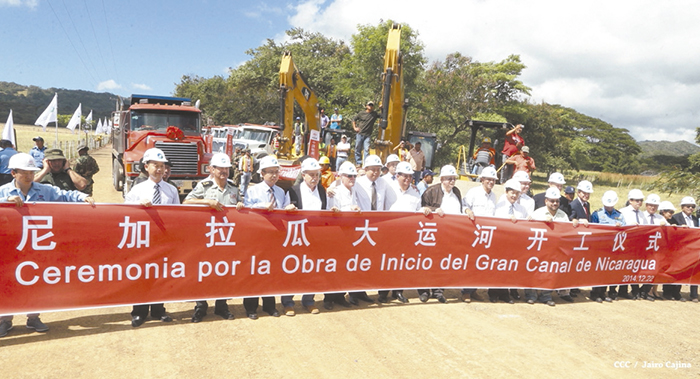
In the opinion of the historian of Managua, Daniel Ortega more than repeated the surrender of Nicaraguan territory to a foreigner, in worse conditions than those granted by President Díaz in 1914.
“A big difference is that that Chamorro-Bryan treaty was signed from State to State, from Nicaragua to the United States, but the Ortega-Wang treaty was signed between a State and a Chinese businessman, which is not a State, which is worse” , he pointed.
«The differences between Díaz and Ortega are, in light of history, the ideological discourse that justified the sale of the country in both events. Ortega on behalf of the people from the left and Díaz on behalf of the people from the conservative right,” said the historian.
The Framework Agreement for Concession and Implementation and the Law of the Grand Interoceanic Canal establish that it is the obligation of the State to guarantee the concessionaire the “access and right of navigation in rivers, lakes, oceans and other bodies of water within Nicaragua and in its waters, and the right to extend, expand, dredge, divert or reduce such bodies of water”.
In addition, the State renounced suing the investors in national and international courts for any damage caused to the environment during the study, construction and operation of the project.
Pharaonic work on paper, on the rights of the people
The comprehensive project of the Grand Canal, according to HKND, would include six sub-projects: the canal, locks included, two ports, a free trade zone, tourist centers, an international airport and several highways.
Other related works are the construction of a power plant, a cement factory and other related industrial facilities to guarantee the supply of materials and ensure the successful completion of the canal in five years, starting in 2014, when the project officially started.

The channel layout is 278 kilometers long, 520 meters wide and up to 30 meters deep. The highway would cross 105 kilometers of Lake Cocibolca and should be ready, according to what was announced in 2013 and ratified in 2014, by the end of 2019, at a cost of more than 50,000 million dollars, more than four times the gross domestic product (GDP) of this country of 6.5 million inhabitants, of which 40 percent live in poverty.
HKND received the management concession for 50 years, plus another 50 years, extendable if desired, in exchange for a payment of ten million dollars each year for the first decade, and the right to one percent of the equity of the “subprojects”. » which would rise to 99% at the end of the concession.
Ortega delivered Nicaraguan land, air and water
Citing a complaint before the Supreme Court of Justice, filed by environmentalists and human rights organizations, the historian said some points that in his opinion show Ortega’s surrender to the Chinese businessman Wang Jing.
“Ortega handed over all the rights to use land, air, water, maritime spaces and natural resources, including full rights to the Great Lake, our main drinking water reserve and any water source,” he explained.
“The law says that the concession is for 100 years, but the legal analysis shows that Ortega yielded, at the discretion of businessman Wang Jing, the submission of the country to any interpretation of the law, so that if Wang Jing says that the concession must be understood unlimited in time in its favor, Nicaragua has no legal defense to oppose, “he said.
“Law 840 says that any property of the Nicaraguan nation, of a municipal, regional or national nature, may be expropriated in favor of the concessionaire, without the latter having to pay any compensation. Practically, the nation’s lands and assets, including natural resources, are handed over to the Chinese businessman,” he said.
Unforgettable: Army and Police Serving the Foreign Entrepreneur
“And beyond that, from what the paper says, what was seen was Ortega putting the Army, the Police, the public powers, at the service of the Chinese businessman and his delegates. It is a shameful act of treason against the real and verifiable homeland,” added the historian.
The approval of Law 840 on June 13, began the longest and most massive protests of the peasant movement throughout the territory, under conditions of repression, threats and state violence.
Related news: Interoceanic Canal remained a “Chinese tale”, but it continues to bleed Nicaraguans
Peasant leaders were harassed, persecuted, threatened, arrested, exiled, and imprisoned. Daniel Ortega used the channel’s speech to promise prosperity in his political speeches until reality forced him to remove the channel from his verbal poverty, when he found out that Wang Jing was falling into economic disgrace.
The last time Ortega spoke about the channel was in September 2022, during the national holidays and after talking about the homeland sellouts. «The channel will at some point be a reality here in Nicaragua. Why? Because it is true that there is a canal through Panama that has been expanded, but the demands of international traffic are so great that the canal through Nicaragua is necessary,” he said without conviction.
A distant speech in energy compared to that of December 2014 when he declared the works of the project inaugurated.
The ships that Ortega will never see
The photo of Ortega posing before the cameras together with Chinese businessman Wang Jing, president of the firm of the Hong Kong Nicaragua Canal Development (HKND) group, in charge of the Nicaraguan Grand Interoceanic Canal project, in the hands of both the treaty, is still alive and circulating on the internet.
What never circulated was a single ship and of those promises only the newspaper articles and memes that circulate from time to time for holidays and vacations remain: «It is reported that for day X the channel will continue to function normally and we will not close traffic ».
“The largest civil engineering project in history” began to unravel with the news of the loss of fortune of Ortega’s Chinese partner, who finally disappeared from the news radar after May 2021, when it was reported that the Stock Exchange Shanghai Securities has delisted Beijing Xinwei Technology Group Co., Ltd. (Xinwei Group) and its chairman Wang Jing from the stock market for malpractice.
That enthusiastic spokesperson for the project, Telémaco Talavera, also disappeared from the public arena along with the chorus of applauders for the canal project and of that mega-work on paper, only a valid law remains and the certainty that Ortega will never see a ship pass from coast to coast. from Nicaragua.
By United Voices
